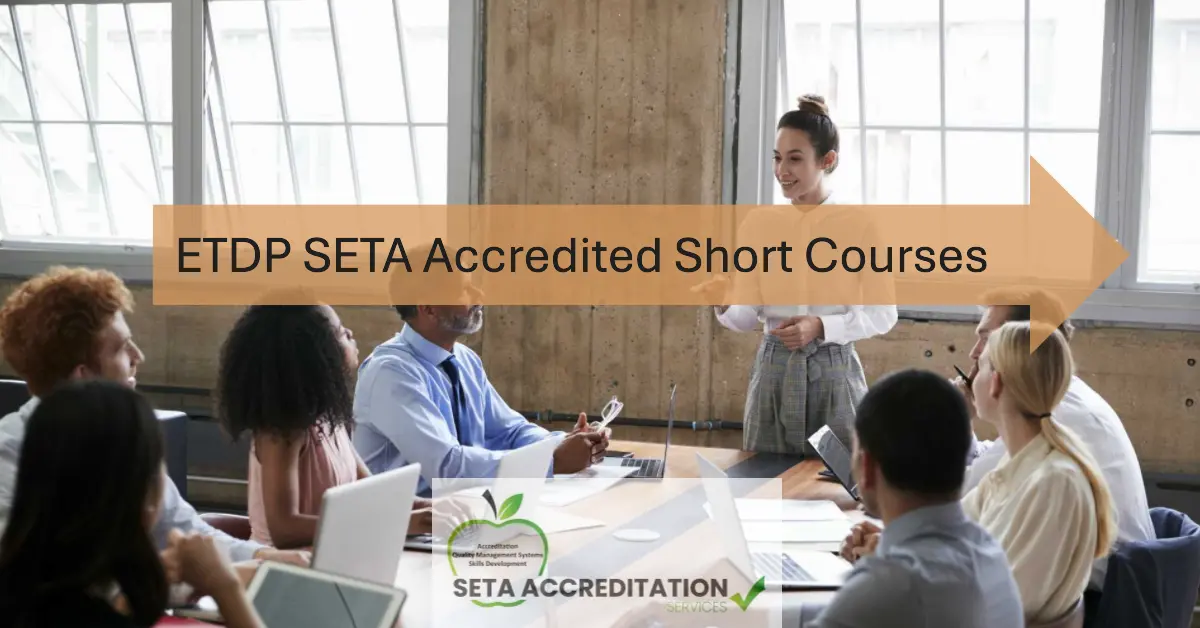Imagine unlocking doors to better job opportunities, higher salaries, and respected credentials—all in just a few weeks. That’s the power of ETDP SETA accredited short courses. Whether you’re a teacher, corporate trainer, HR professional, or someone looking to break into the education sector, these courses can fast-track your career with nationally recognized qualifications.
But not all training programs are created equal. With so many providers claiming to offer “accredited” courses, how do you know which ones are legitimate? And what exactly can these qualifications do for your career?
This guide cuts through the noise, giving you everything you need to know about ETDP SETA short courses—from choosing the right program to landing high-paying jobs in education and training.
What Is ETDP SETA and Why Does It Matter?
ETDP SETA (Education, Training and Development Practices Sector Education and Training Authority) is the body responsible for setting skills development standards in South Africa’s education and training sector. Unlike generic courses, ETDP SETA-accredited programs meet strict national benchmarks, ensuring your certification is respected by employers, government agencies, and NGOs.
Here’s why accreditation matters:
- Quality Assurance – Every accredited course undergoes rigorous checks to ensure it delivers real, practical skills.
- Employer Recognition – Many government and corporate jobs require ETDP SETA qualifications.
- Career Mobility – These certifications open doors to promotions, consulting gigs, and international opportunities.
If you’re serious about advancing in education, training, or HR, an ETDP SETA course isn’t just an option—it’s a career necessity.
Top ETDP SETA Accredited Short Courses to Transform Your Career
1. Assessor Course
Best for: Teachers, HR professionals, and workplace trainers
What you’ll learn: How to conduct fair, standardized assessments aligned with the National Qualifications Framework (NQF).
Career impact: Become a certified assessor for colleges, workplaces, or SETA-funded programs.
2. Moderator Course
Best for: Experienced assessors looking to advance
What you’ll learn: How to oversee assessments, ensure quality, and uphold national standards.
Career impact: Work as a quality assurance specialist in training institutions or corporate environments.
3. Facilitator Course
Best for: Aspiring trainers, public speakers, and educators
What you’ll learn: How to design and deliver engaging training sessions for diverse audiences.
Career impact: Lead workshops, corporate training programs, or start your own facilitation business.
4. Skills Development Facilitator (SDF) Course
Best for: HR professionals and training coordinators
What you’ll learn: How to develop Workplace Skills Plans (WSPs), manage training budgets, and apply for SETA grants.
Career impact: Become a strategic training manager in corporations or a freelance SDF consultant.
Why Employers Value ETDP SETA Qualifications
1. Government & NGO Jobs Require Them
Many public sector roles—especially in education and skills development—explicitly ask for ETDP SETA certifications. If you want to work in:
- Municipal training programs
- National skills development projects
- NGO-funded education initiatives
…then these qualifications are non-negotiable.
2. Higher Earning Potential
Freelance assessors and facilitators charge R300–R1,500 per session, while full-time SDFs in corporate roles earn R25,000–R50,000 per month. These courses pay for themselves quickly.
3. Stand Out in a Competitive Job Market
With thousands of trainers claiming to be “qualified,” an ETDP SETA certificate proves you’ve met national standards. It’s the difference between being overlooked and landing your dream role.
How to Choose the Right Training Provider (Without Getting Scammed)
Not all “accredited” providers are legitimate. Follow these steps to avoid wasting time and money:
✅ Verify Accreditation – Check the ETDP SETA website for the provider’s accreditation number.
✅ Read Reviews – Look for testimonials from past students (Facebook, Google, and HelloPeter are good sources).
✅ Compare Course Fees – Prices should range between R3,000–R10,000 depending on the course. Too cheap? Probably a scam.
✅ Ask About Support – Will you get tutor assistance? How quickly are assessments marked?
Real Success Stories: How ETDP SETA Changed Lives
- Thando M. was a high school teacher struggling with low pay. After completing her Facilitator and Assessor courses, she now runs corporate training programs, tripling her income.
- Sipho K. was unemployed until he got his Moderator certification. Today, he works with three different colleges as a freelance quality assurance specialist.
- Lerato P. used her SDF qualification to help companies claim skills development levies—now she consults for major firms across Gauteng.
FAQs – Your Biggest Questions Answered
A: Yes! Many providers offer blended or fully online options—just ensure they’re ETDP SETA-approved.
A: Most take 1–3 months, depending on your pace.
A: Many courses only require Grade 12 + relevant experience. Recognition of Prior Learning (RPL) can also help.
A: Many graduates secure roles within 3–6 months, especially if they network with training companies.
Your Next Step: Enroll Today & Future-Proof Your Career
ETDP SETA short courses aren’t just certificates—they’re career game-changers. Whether you want to earn more, gain credibility, or transition into training, these programs give you the skills and recognition to succeed.
Ready to take the first step? Find an accredited provider, check their reviews, and enroll today. Your future self will thank you.

